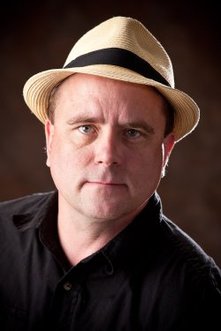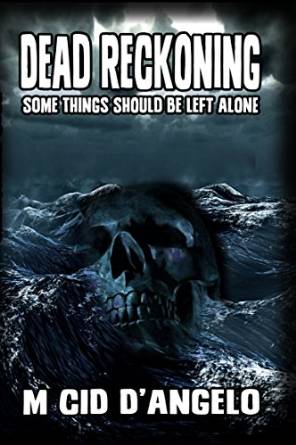
Bio: "I write because I believe in literature; I believe that the art of words is louder than sound, more colorful than paintings.
My novels are written not because of the pursuit of money or even success, but in the FAITH that they exalt our experiences; that not only do they give us enjoyment to read them, but they are meant to open worlds that a reader may not ever imagine."
M Cid D'Angelo has been published in literary journals such as EUREKA LITERARY MAGAZINE, AIOFE'S KISS, LADY JANE'S MISCELLANY, THIRD WEDNESDAY, MORONIC OX (WWW.MORONICOX.COM), MIDWAY JOURNAL (WWW.MIDWAYJOURNAL.COM), MILITARY HISTORY, and LOST TREASURE.
His latest short stories can be found at decomP magazinE and The Legendary.
He was agented at one time by the WriteHigh Literary Agency (Beverly Hills, CA) and the Cherry Weiner Literary Agency (New Jersey)
Links:
Amazon: http://www.amazon.com/M-Cid-DAngelo/e/B004LBAUNG
Goodreads: https://www.goodreads.com/author/show/4612604.M_Cid_D_Angelo
Smashwords: https://www.smashwords.com/profile/view/artemusdark
Facebook: https://www.facebook.com/pages/M-Cid-DAngelo-Author/442132502526836
Twitter: https://twitter.com/artemusdark
1. Your book Dead Reckoning just came out through JEA, it’s clearly a very involved novel with some twists and turns. Can you tell us a bit about the process of writing it?
There are two narratives in the story, the main plot as well as an analysis by a narrator. The novel itself is a psychological horror story, an intense study in the lives of two normal people who are subject to an intangible “evil” haunting the Outer Banks of North Carolina. This meant I had to play two roles in the writing of the novel – a factual presentation as well as a storyteller. Both sides augment each other, and it was paramount to establish each section in that way, and not to wander off on tangents.
2. Much like House of Leaves by Mark Z. Danielewski this one involved some other bits and pieces, things that build the story up and make it more involved, did you have to do any research for it? What made you choose the style and story?
The novel is set up in two sections, actually. The main narrative is a straight-forward tale, day-to-day life, of the main characters – Annie Mitchell and Stewart Eddinger. The second section is broken up into addenda material, that is, special and “extra” material that is not part of the main narrative, but expands and enhances the tragic events surrounding the main characters and the oceanographic project they’re working on. It’s a video diary in its way. The novel is meant to be visual in a highly literary way.
Most of the addenda material is taken from a variety of sources and shaped for the use of the novel itself. There is, despite the horror/supernatural elements behind it, a scientific approach. This is a novel steeped in oceanography and marine biology. It is a novel that has seen years of my personal interest in these fields of study.
3. Do you often write stories of the supernatural? If so, what supernatural topics interest you as a writer? Any that rub you the wrong way or you think are done to death?
There is always, at least, a slight tinge of what we would term “paranormal” or “preternatural” in my stories, even the literary ones. When I was younger, I wrote much speculative fiction, but as I’ve gotten older, these elements usually become a backdrop to the main narrative rather than the plot itself. Dead Reckoning is a straight-up supernatural/horror novel, however and was written when I was younger and still given to that phase.
I enjoy ghostly stories and hauntings mainly. I’m not big into vampires or werewolves or pulp fiction monsters; these have been trod over again and again in many forms. Some of these stories have been innovative and clever, but most are usually rehash.
4. What other genres do you write? Tell us a bit about some of your other publications.
I am a published short story author, and I also have some nonfiction articles in hobby/special interest magazines like Lost Treasure (a metal-detecting magazine) and Military History. Most of my short stories tend to be literary, that is, sans sci-fi/horror/fantasy etc., and are closer to works written by literary authors such as Joyce Carol Oates and Dylan Thomas. These short stories can be found in a myriad of online and in print university-based literary journals.
5. What’s your take on writing as an industry? Should authors be giving the same value to indie markets as they do to traditional publishers? Are they equal?
I have a nostalgic heart for the traditional markets. I’ve had literary agent contracts and one of my other novels, Dark Running, was slated to be picked up by Simon & Schuster some years ago. That deal fell through, however, and made me rather bitter! It made my agent at the time very bitter too. However, the Big Houses can offer substantial advances and a high profile that Indies and Small Presses cannot. This outlook is changing, though, I believe. Many small presses and Indies are gaining power and recognition.
6. Do you find promotion and submission difficult? What do you think can be done to make things a bit better for writers like yourself? What would you tell newer authors based on your own experiences?
Promotions for me are difficult because of budgeting. Money is the main qualifier here. Some people can shamelessly promote themselves and have a good financial base (paychecks, family, loans etc) to push their books. I believe I’m too frugal to actually make a dent in effective promotion and rely on others and word-of-mouth way too much. Submissions, on the other hand, are not an issue. I submit in sprints, usually, but also during specific times of the year when markets are more open to submissions. I’ve relied somewhat on my platform as a traditionally-published short story author too – but so far, I haven’t seen any progress toward book sales or literary contracts in that vein. I’m known, but I don’t seem to be a demand! ;)
7. How long have you been writing? Was it always something you wanted to do? Have your experiences been good thus far?
I remember wanting to write short stories when I was in my single-digits, and have written continuously ever since. I enjoy the act of writing – the creation – but I feel that I haven’t been as successful as I should be, especially when it comes to making a living.
8. What other books do you have in progress or do you hope to be done with in the next few years?
As of late I’ve been rather aimless and lethargic. Sometimes there are periods of rediscovery and reinvention of what a writer needs to be. I am working on a martial arts/Wuxia/fantasy novel set in ancient China that is reminiscent of Crouching Tiger Hidden Dragon, but the first draft has been hit and miss. I’m also working on a pseudo sci/fi book about modern psychic spies working in the US Government and private contractors (ala Jon Ronson’s The Men Who Stare at Goats).

 RSS Feed
RSS Feed
